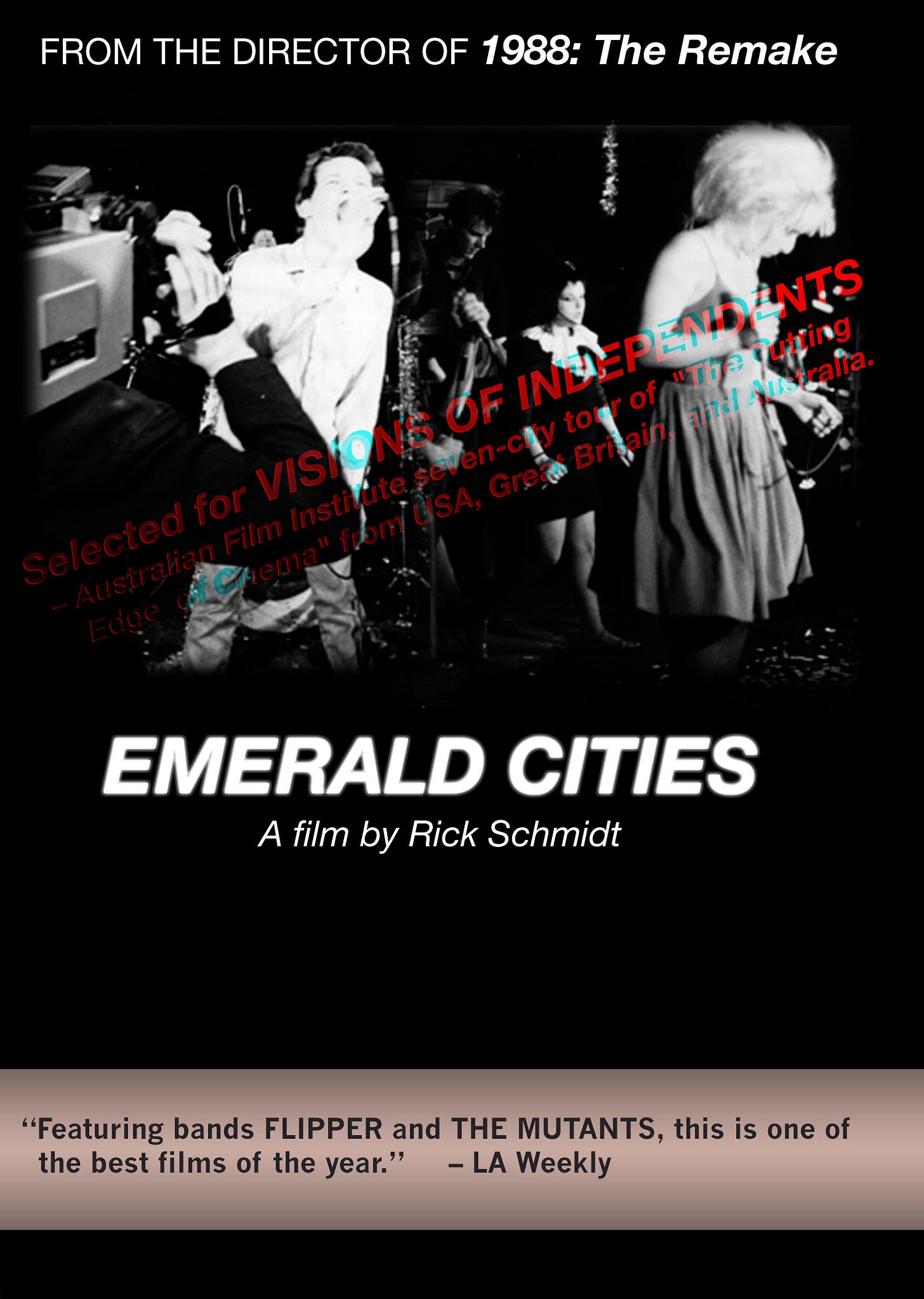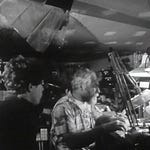“The film [EMERALD CITIES], is Rick Schmidt’s provocative, and compassionate 'howl' at the gathering tide of nuclear lunacy as the mass media adjusts us to the 'new dark ages' of limited nuclear war. Schmidt‘s film style is blending the mad-cap humor of the Marx Brothers, a heady version of American surrealism, and iconoclastic inspiration, perhaps from Jean Luc Godard.”—Vic Skolnick, CINEMA ARTS CENTRE
FULL FEATURE (click below):
“After not seeing the film [EMERALD CITIES] for ages it was a delight to experience how absolutely mad the film is. Very Topsy- Turvy with little regard for helping the audience keep track of what exactly is going on, except to be a witness to the world completely falling apart. Nothing Wishy Washy about your political point of view either and your radical disregard for much establish cinema language. This potpourri is outrageously disrespectful to all established institutions, from fatherhood, to Santa Claus. It needs a warning label on it to shelter anyone who still loves mom’s apple pie, and the myth of America. Congratulations. We need a good slap in the face once in a while, and EMERALD CITIES delivers it.” —William Farley, writer/director, PLASTIC MAN, I WANTED TO BE A MAN WITH A GUN––Three American Soldiers in WWII, etc.
“There are moments in its narrative sequences [EMERALD CITIES], as well as the musical interludes featuring new wave bands Flipper and The Mutants, of genuine apocalyptic craziness.” —CHICAGO READER
THREE REVIEWS FROM LETTERBOXD
★★★★ Watched by mumblecorgi 06 May 2025 7
If you're obsessed with the 1980s San Francisco Bay Area punk group Flipper, like I am, Rick Schmidt's Emerald Cities will make complete sense! The experimental feature from 1983 has some of the boldest assemblages of genres prior to the Wachowskis and Tykwer's Cloud Atlas. It's part road movie, man-on-the-street interview, music video, essay film, dystopian sci-fi, and documentary. And, somehow, this conglomeration of disparate forms coheres beautifully. One core thread follows a father (who is always dressed as Santa Claus) and grown daughter who live in a remote section of Death Valley. Because of his wife and her mother's death, she was "raised by television." She dreams of leaving Death Valley and becoming a movie star. When Ted Falconi, the guitarist of Flipper, shows up at the market they run, she bolts for San Francisco with him. The despondent father follows, and soon it becomes his movie (for hilariously meta reasons that are explained at film's end). Atop this narrative we get interviews with people about their thoughts on Santa Claus and the commercialism that links American values and Christianity, live concert footage of Flipper ("I Saw You Shine," "One by One," and "Love Canal") and the long-forgotten SF new wave act The Mutants, news clips about America's nuclear arsenal prominently featuring members of the Reagan administration, and a side plot about a politician who, among other things, seeks to ban the year 1984 in an effort to prevent the fear that the year will turn out like George Orwell's popular 1949 novel. The movie wonderfully taps into Cold War fears of nuclear armageddon, a seething punk hatred for Ronald Reagan, an endearing DIY sloppiness, and the power of awkward chance encounters. If you've sensibly waded deep into the waters of the Flipper discography (sample lyric from "Love Canal" -- "We are bitter / Poison is killing our very cells / We are dying / Our common grave is the love canal"), Emerald Cities comes highly recommended from this guy! Others, expecting something more structurally coherent, may want to proceed with caution.
★★★★ Watched by Graham Williamson 27 Aug 2019
I suppose it's always the way with cult movies that you're either going to love 'em or hate 'em, but even so I was astonished at this juncture to find that one of Nicolas Winding Refn's ByNWR restorations is actually, genuinely good! I'd have settled for "not shit", but this is something I enjoyed!
Emerald Cities is what Repo Man might have been had Alex Cox not inexplicably managed to secure studio backing for it, allowing him to hire a… more
★★★½ Watched by louferrigno 21 Sep 2021
Several filmmakers resist the urge of the mainstream Hollywood market, preferring to work in complete independence without fear of their work getting cut up by schlubs in it for a quick buck and in doing so explore new artistic territories, all with the risks that come with having to film from the money out your pocket. Rick Schmidt, a Arizona native who drifted towards filmmaking in California's Bay Area by happenstance, quite literally wrote the book on the struggles and important tips one needs to learn when working without a major studio (hell, he wrote TWO books, one in 1988, the other in 2004), and he learned many of them the hard way as he slowly constructed his first three films in the span of a decade, united by several common cast members and thematically exploring personalities and worlds on the brink of falling apart. A Man, a Woman, and a Killer observed the fragile bonds of lovers (co-directed by Schmidt's roommate Wayne Wang who, unlike Rick, decided to give Hollywood a try), 1988: The Musical zeroed in on a dying man's aspirations for show business, and Emerald Cities analyzed society's fears of apocalypse in the Reagan 80's, achieving it with a ragtag sense of inevitability and taking pristine snapshots of the cultural zeitgeist of the world, California, and those still trying to find hope that an idealized form of the American Dream is attainable when collapse seems near.
Christmas 1983, a time devoid of jolliness or enthusiasm from the public as nuclear war is constantly threatened and Orwell's vision of the year 1984 is no longer a far-off possibility. Incorporating a lot of fly-on-the-wall news broadcasts, improvised interviews, and assorted found footage, Schmidt acknowledges America's willingness to throw itself towards oblivion, the endless costs in funding war machines for the Cold War, the inability to learn our lesson after Hiroshima's devastating impact on a section of humanity, and criticizes through simple reflection the mainstream media's endless hopelessness and perpetuation of doomsday. Through this the nature of Christmas as a time of innocence and merriment is completely shot down, many of the adults asked about Santa Claus inadvertently demonstrating the futility of fantasy at its purist when reality could cause a missile to destroy the entire country, and Schmidt documents America's paranoia and dread in response to a president oblivious to the fact that no-one is "good" for racing towards a nuclear crisis. Nobody wants to celebrate Christmas at ground zero, but Schmidt subjects us to the concerns of that reality when the only thing the news can talk about are the MX missiles that promise nothing but apocalypse.
The crux of the film lies in the two characters and the two bands we end up following/seeing in-between the video collages, opting to try and find life, purpose, and some sort of response to the global shitshow. Z wants more in life, or at least wants to see more than what the green-tinted TV tells her is life, and finds solace in hitting the road towards San Francisco thanks to the wayward car driven by Ted Falconi (Flipper), attempting to push away from the hopelessness on TV and see the fallout herself. Her father, Ed, sees hope in the emerald-tinted vision of the world he sees on his TV, trying to hitch rides to find his daughter again, donning his Santa costume as a reflection of the yearly job (AKA the two days of the year he's not allowed to drink beer, which frankly doesn't really stop him) he has as an impersonator as well as becoming a representative of the last glimmers of hope in America, the last spark of dreams and yearnings for peace that's become an outlier of optimism in a world trained by cynicism. As Ed's pursuit also shows signs of crumbling, two punk bands channel the world's anger as their lyrics get printed on-screen as a sort of mutual mantra between the young and frustrated, The Mutants offering upbeat numbers about the world's self-admittance to damnation while Flipper downtunes the mood in grungy noise-punk and being upfront in the nuclear warfare's massive ability to make all people and institution cease to exist. All of these little side-stories offer direct, personal accounts within a world tearing itself apart, contrasting and pairing with each other until the film itself breaks down order and pushes closer towards the world's central mood.
It's almost miraculous that Emerald Cities works as well as it does, it uses narrative incoherence to actually support the themes of the movie, and the extensive TV footage that takes up half the film, while still probably being too much at times, offer compelling insights and perspective of the world and America from 1980 to 1983. Schmidt blurs the line between reality and fiction with the same roguish intent as his musical peers, and manages to fine-tune itself into a ordered chaos, a daring feat given the extensive amount of improvisation used (like Ed's heartbreaking attempt to find comfort in nostalgia in front of a silent pair of elderly Mormons) and spur-of-the-moment solutions to pretty major changes outside his control (I won't go into detail, but it is pretty endearing seeing Schmidt being open and upfront about a cost-cutting trick most low-budget filmmakers would badly attempt and hope the audience doesn't notice). It should be noted that this is one of the films restored and released via the ByNWR service, which is something that's severely disappointed me eight films in a row, so color me surprised that it's managed to pull something forgotten from the world that's not softcore tits, is actually somewhat socially relevant and reflects an honest-to-good true perspective of its times, and is genuinely pretty good (making it one of 3 films out of 18 so far that's actually gained that sentiment, yeah, again, this is why I usually take long gaps in-between watching the service's films). A bonafide flash of inspiration and a cathartic watch, in a cosmic sort of way.
—————
“This is a fun read (“NEW DARK AGES, HOW A PUNK MOVIE EMERALD CITIES GOT ITS IMPROV"). How Schmidt overcomes obstacles, physical and mental, is a miracle of inventiveness, imagination, perseverance and determination matter-of-factly remembered and told. New Dark Ages vividly catalogues the everyday efforts required to bring forth his indie film-making odyssey Emerald Cities and in the process (as an aside) also his successful book “Feature Filmmaking at Used-Car Prices” (Viking/Penguin). And he triumphs against all odds to produce, finance, direct, shoot, edit, launch and distribute his zany movie to international festivals and acclaim. ––Bibbi Lee, translator, NOTHING GROWS BY MOONLIGHT, PEAKS AND BANDITS. etc.
Bruce ‘Loose’ Calderwood, FLIPPER, 1979.
“As with Schmidt's earlier 1988-THE REMAKE, EMERALD CITIES displays editorial wizardry which mixes moods and media in a dizzying pace which at first seems haphazard, but which at second glance takes on an order which its material would seem incapable of producing. The plot involves the escape of “Z” from her tawdry mobile-home television-dominated existence to San Francisco, pursued by her alcoholic, Santa-suited father. Enroute, are encounters with a mug- book full of California characters, intercut with commentaries culled from commercial video. And yet, despite its dark undertones and serious intent, EMERALD CITIES plays as a romp, provocative for sure, but nevertheless essentially joyful and even hopeful under the most baleful of circumstances.” —Jon Jost, Filmmaker, SURE FIRE, ALL THE VERMEERS IN NEW YORK, etc.
————-













